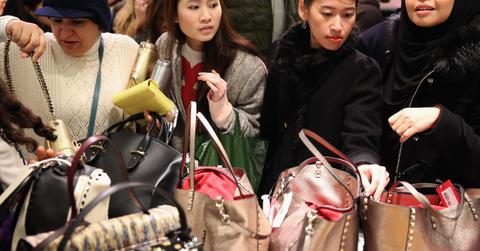Exotic Animal Skins Are Leaving U.K. Department Store Selfridges' Shelves
"Conscientious and informed consumers absolutely reject the exotic-skins trade," a representative for PETA tells Green Matters.
Updated Feb. 28 2019, 5:27 p.m. ET

Now that Beyoncé is vegan, she's probably not in the market for any more pairs of albino alligators — and the fashion world is taking note. U.K. department store chain Selfridges just announced that it is banning the sale of exotic animal skins, which includes alligator, snake, crocodile, and lizard skins. As reported by The Telegraph, Selfridges is one of the first major department stores to stop selling these products.
Customers will start seeing the lack of purses, shoes, belts, and more made from exotic animal skins in 2020. The move comes as a response to PETA asking Selfridges to ban reptile skins, according to a post on the animal rights organization's website. It's also part of Selfridge's Buying Better, Inspiring Change initiative, which aims to promote the sale of sustainable items in its stores.
"As one of the first department stores to ban the sale of fur in 2005, we are committed to phasing out the sale of exotic skins by February 2020," reads a statement on Selfridges' website. "This marks a continuation of our longstanding commitment to place ethics and sustainability at the heart of everything we do."
“We are dedicated to being at the very forefront of future-thinking retail," Sebastian Manes, Selfridges Buying Director, said in a statement shared by PETA. "For us, that’s a future where luxury is defined by craftsmanship and material innovation.”
In a statement sent to Green Matters, Yvonne Taylor, PETA's Director of Corporate Projects, explained why it's important to stop buying animal skins. "Hats off to Selfridges – which had already banned fur, angora, and foie gras after persuasive talks with PETA – for now ending the sale of wild animals' 'exotic' skins," Taylor tells Green Matters in a statement. "Conscientious and informed consumers absolutely reject the exotic-skins trade, which invariably torments and kills crocodiles, snakes, lizards, and other sentient, beautiful animals in appalling ways for fashion."
As noted on the Buying Better, Inspiring Change page of Selfridges' website, Selfridges previously stopped selling clothing made from fur and angora and cosmetics made with shark oil (also known as squalene) in its shops, and it also banned foie gras and endangered fish from its restaurants. Additionally, Selfridges announced that beginning in 2020, it will only sell leather products made from the skin of agricultural livestock.
Later this year, the store will introduce "a new Responsible Leather label ... highlighting accessories created using environmentally responsible production methods." Leather is cruel to animals and destructive to the environment no matter if it comes from an animal bred for meat, for leather, or for both, so labeling a leather item "responsible" is more so greenwashing than actually a positive change for animals. That said, it's still amazing that Selfridges is making steps toward one day eliminating animal cruelty from its stores altogether.
In addition to Selfridges (and department store Liberty), designers including Victoria Beckham, Vivienne Westwood, Chanel, and Diane von Furstenberg have also stopped using exotic animal skins for fashion, Harper's Bazaar reported. Hopefully other shops and designers take note and start selling more and more animal-free fabrics.